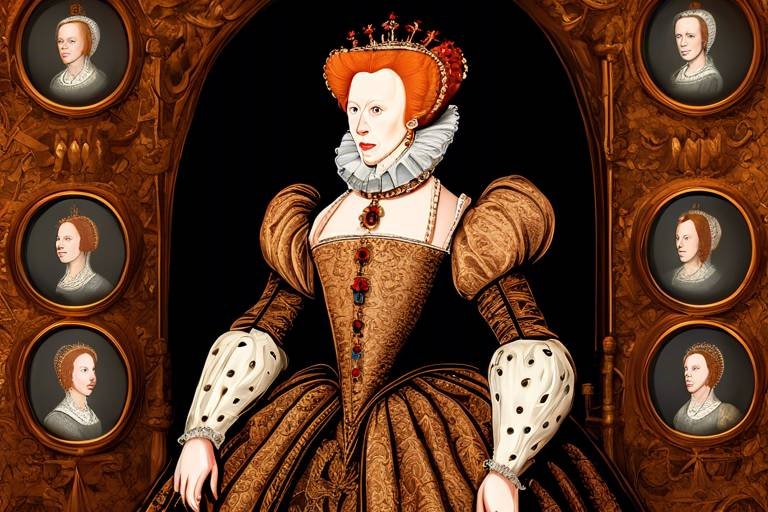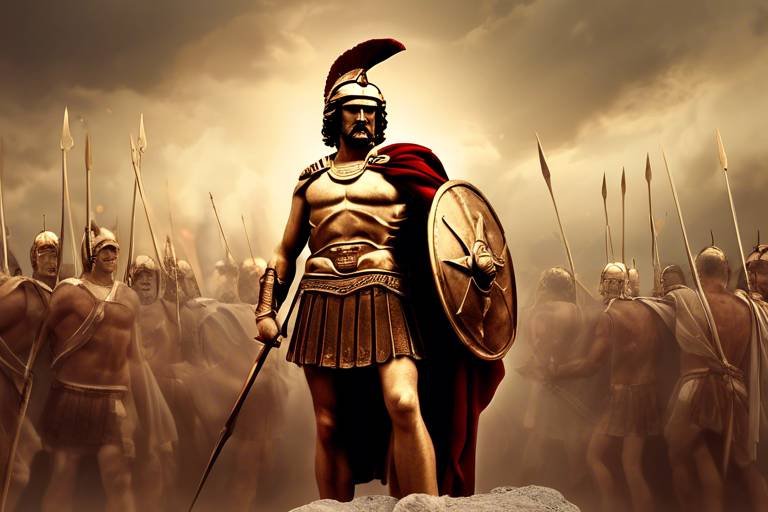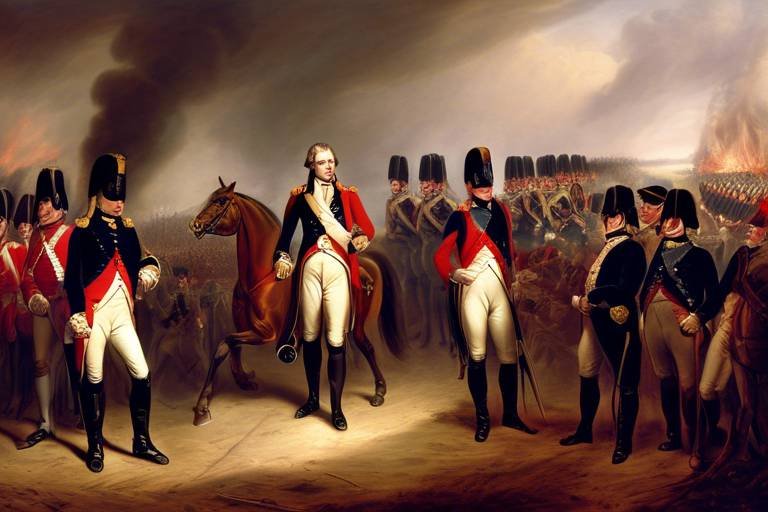Oliver Cromwell: The Lord Protector of England
Oliver Cromwell, a towering figure in English history, ascended to power as the Lord Protector following the tumultuous period of the English Civil War. His impact on the political landscape of England was profound and enduring, shaping the nation's future in ways that are still felt today.
From his humble beginnings to his meteoric rise, Cromwell's journey is a testament to ambition and determination. His early life and background played a crucial role in shaping his character and beliefs, laying the foundation for his later endeavors in both politics and warfare.
As a key figure in the English Civil War, Cromwell's leadership and military prowess were instrumental in securing victory for the Parliamentarian forces. The Battle of Naseby stands out as a defining moment, showcasing Cromwell's strategic genius and solidifying his reputation as a formidable commander.
The execution of King Charles I marked a turning point in English history, leading to the establishment of the Commonwealth and the abolition of the monarchy. Cromwell's involvement in this pivotal event underscored his commitment to the cause of parliamentary sovereignty and paved the way for his eventual role as Lord Protector.
Assuming the title of Lord Protector, Cromwell faced a myriad of challenges in governing England. His tenure was marked by constitutional changes aimed at consolidating power and establishing stability. The dissolution of the Rump Parliament and the implementation of the Instrument of Government were among the key reforms enacted during his rule.
Despite his domestic focus, Cromwell's foreign policy decisions had far-reaching implications for England's relations with other nations. His legacy as a statesman continues to be debated, with historians assessing the lasting impact of his rule on the country's political development.
Cromwell's death and the subsequent restoration of the monarchy marked the end of an era in English history. The complex legacy he left behind continues to spark controversy and debate, with interpretations of his actions and policies varying widely among scholars and historians.

Early Life and Background
Exploring the life and legacy of Oliver Cromwell, a significant figure in English history who rose to power as the Lord Protector after the English Civil War, shaping the nation's political landscape.
Oliver Cromwell, born in 1599 in Huntingdon, England, came from a modest gentry family. His early life was marked by rural upbringing and a strong Puritan influence, shaping his religious and political beliefs. Cromwell received education at the University of Cambridge, where he showed an interest in law and governance. His experiences during the early years, including managing his family's estate and serving as a member of Parliament, laid the foundation for his later political and military career.
Examining Cromwell's pivotal role in the English Civil War, his military strategies, and leadership that led to the defeat of the Royalist forces.
Detailing Cromwell's decisive victory at the Battle of Naseby in 1645, a turning point in the Civil War that solidified his reputation as a skilled military commander.
Discussing Cromwell's involvement in the trial and execution of King Charles I, an event that marked the end of the monarchy in England and the establishment of the Commonwealth.
Exploring Cromwell's tenure as the Lord Protector of England, his governance, religious policies, and the challenges he faced in maintaining stability.
Analyzing the constitutional reforms implemented by Cromwell during his Protectorate, including the dissolution of the Rump Parliament and the establishment of the Instrument of Government.
Evaluating Cromwell's foreign policy decisions, his impact on England's relations with other nations, and the lasting legacy of his rule on the country's political development.
Reflecting on the circumstances surrounding Cromwell's death, the restoration of the monarchy, and the subsequent historical assessments of his controversial legacy.

Role in the English Civil War
Oliver Cromwell played a crucial role in the English Civil War, a tumultuous period that reshaped the political landscape of England. His military prowess and strategic leadership were instrumental in the Parliamentarian victory over the Royalist forces. Cromwell's dedication to the cause of parliamentary supremacy and his unwavering commitment to the principles of the Puritan movement set him apart as a formidable figure in the conflict.
Throughout the Civil War, Cromwell distinguished himself on the battlefield with his innovative tactics and disciplined troops. His decisive victory at the Battle of Naseby in 1645 marked a turning point in the conflict, showcasing his ability to outmaneuver and outwit his opponents. Cromwell's military acumen and unwavering determination earned him the respect and admiration of his soldiers and fellow commanders, solidifying his reputation as a skilled and strategic leader.
As the conflict progressed, Cromwell's influence within the Parliamentarian ranks grew, leading to his eventual rise as one of the key figures in the New Model Army. His leadership and organizational skills were pivotal in shaping the army into a formidable fighting force that ultimately secured victory for the Parliamentarians. Cromwell's role in the English Civil War not only shaped the outcome of the conflict but also laid the foundation for his future political ambitions and legacy as the Lord Protector of England.

Battle of Naseby
The Battle of Naseby in 1645 was a defining moment in the English Civil War, where Oliver Cromwell showcased his military prowess and strategic brilliance. Leading the Parliamentarian forces against the Royalists, Cromwell orchestrated a decisive victory that shifted the course of the war.
On that fateful day, the two armies clashed on the fields of Naseby, with Cromwell's New Model Army demonstrating superior discipline and tactics. The Parliamentarians effectively utilized their cavalry, infantry, and artillery, outmaneuvering the Royalist forces led by King Charles I.
Cromwell's leadership on the battlefield was instrumental in securing a resounding triumph, capturing thousands of Royalist soldiers and effectively crippling the King's military capabilities. The Battle of Naseby marked a turning point in the Civil War, cementing Cromwell's reputation as a formidable military commander.

Execution of King Charles I
During the turbulent times of the English Civil War, Oliver Cromwell found himself at the center of a controversial and historic event - the execution of King Charles I. Cromwell, along with other Parliamentarian leaders, played a significant role in the trial and subsequent execution of the King, which took place on January 30, 1649. This momentous event marked the first time in English history that a reigning monarch was put on trial and sentenced to death by his own subjects.
The trial of King Charles I was a highly contentious and divisive issue, with supporters of the monarchy condemning the actions of Cromwell and the Parliamentarians as regicide. However, Cromwell and his allies believed that the King's actions, including his attempts to assert absolute power and suppress Parliament, justified his removal from the throne. The execution of King Charles I was seen as a necessary step towards establishing a more accountable and representative form of government in England.
Following the execution of the King, England entered a period of political upheaval and uncertainty. The monarchy was abolished, and the country was declared a Commonwealth under Cromwell's leadership. The repercussions of this event were felt not only in England but also reverberated throughout Europe, where the traditional notion of divine right monarchy was challenged by the actions taken against King Charles I.

Lord Protectorate
During his tenure as the Lord Protector of England, Oliver Cromwell faced numerous challenges and responsibilities in governing the nation. As a staunch Puritan, Cromwell sought to establish a government based on religious principles, promoting moral values and strict adherence to his vision of a godly society. His Protectorate marked a significant departure from traditional monarchical rule, with Cromwell wielding considerable power and authority over England.
One of Cromwell's key objectives during his Lord Protectorate was to enact constitutional changes that would solidify his position and ensure the stability of the government. He dissolved the Rump Parliament, which had become ineffective and uncooperative, and established the Instrument of Government in 1653, outlining the framework for a more centralized and efficient administration. These reforms aimed to streamline governance and prevent the chaos that had characterized the previous years of political turmoil.
In addition to domestic reforms, Cromwell also focused on shaping England's foreign policy and strengthening its position on the international stage. His leadership in foreign affairs was characterized by a pragmatic approach, balancing diplomatic negotiations with military interventions when necessary. Cromwell's efforts to expand England's influence and secure trade partnerships with other nations laid the foundation for future diplomatic endeavors and shaped the country's role in global politics.
Despite his efforts to govern effectively, Cromwell faced opposition from various factions, including royalists, radicals, and dissident religious groups. The challenges of maintaining order and unity in a nation still reeling from the aftermath of civil war tested Cromwell's leadership skills and political acumen. His authoritarian rule and suppression of dissent sparked controversy and criticism, leading to a complex legacy that continues to be debated by historians and scholars.

Constitutional Changes
During his tenure as the Lord Protector of England, Oliver Cromwell implemented significant constitutional changes that aimed to consolidate his power and establish a more stable government structure. One of the key reforms was the dissolution of the Rump Parliament, which Cromwell viewed as ineffective and corrupt. By disbanding the existing parliamentary body, Cromwell sought to create a new governing framework that he believed would better serve the interests of the nation.
In place of the Rump Parliament, Cromwell established the Instrument of Government in 1653, a written constitution that outlined the powers and responsibilities of the Lord Protector and his council. This document effectively centralized authority in Cromwell's hands, granting him broad executive powers to govern the country. The Instrument of Government also introduced a system of checks and balances to prevent any one individual or group from accumulating too much power, although in practice, Cromwell's authority remained paramount.
Furthermore, Cromwell's constitutional changes included the division of England into military districts governed by Major-Generals appointed by the Lord Protector. This restructuring aimed to maintain order and security throughout the country, with the military playing a prominent role in enforcing Cromwell's policies and maintaining control over potential dissent. While these measures were intended to strengthen Cromwell's grip on power and ensure stability, they also sparked resistance and criticism from those who opposed his authoritarian rule.

Foreign Policy and Legacy
Oliver Cromwell's foreign policy decisions and legacy played a crucial role in shaping England's relations with other nations and influencing the country's political development. As the Lord Protector, Cromwell pursued an assertive and pragmatic foreign policy aimed at safeguarding England's interests and expanding its influence on the international stage. One of his key priorities was to secure alliances with Protestant states in Europe, such as the Dutch Republic and Sweden, to counter the Catholic powers of Spain and France.
Cromwell's foreign policy was characterized by a mix of military interventions, diplomatic negotiations, and trade agreements. He sought to bolster England's naval power and established a formidable navy to protect English interests and trade routes. Cromwell's military campaigns in Ireland and Scotland aimed to consolidate English control over these territories and suppress any potential threats to his rule.
Furthermore, Cromwell's legacy in foreign affairs extended beyond his lifetime, influencing subsequent English leaders and their approach to international relations. His emphasis on promoting Protestant interests and defending English sovereignty set a precedent for future foreign policy decisions. The diplomatic alliances and military victories secured during Cromwell's tenure as Lord Protector laid the foundation for England's emergence as a major European power in the centuries to come.

Death and Aftermath
After a tumultuous life filled with political upheavals and military triumphs, Oliver Cromwell met his end in 1658. His death marked a significant turning point in English history, as it paved the way for the restoration of the monarchy. Cromwell's passing left a void in the leadership of England, and his legacy was fiercely debated in the years that followed.
Following Cromwell's death, his son Richard briefly succeeded him as the Lord Protector but lacked his father's political acumen and military prowess. The Protectorate faced internal strife and external threats, leading to its eventual collapse. The restoration of the monarchy under Charles II in 1660 signaled the end of the Commonwealth era and the return to monarchical rule in England.
Despite his controversial legacy, Cromwell's impact on English politics and society was profound. His rule challenged traditional power structures, promoted religious tolerance, and laid the groundwork for future constitutional developments. The debates surrounding Cromwell's legacy continue to this day, with historians and scholars offering differing perspectives on his contributions and shortcomings.
Frequently Asked Questions
- Who was Oliver Cromwell?
Oliver Cromwell was a significant figure in English history who rose to power as the Lord Protector of England after the English Civil War. He played a crucial role in shaping the nation's political landscape during his tenure.
- What was Oliver Cromwell's role in the English Civil War?
Oliver Cromwell played a pivotal role in the English Civil War as a skilled military commander. His leadership and military strategies led to the defeat of the Royalist forces, ultimately contributing to the end of the conflict.
- What were some of Cromwell's key achievements during his Lord Protectorate?
During his time as the Lord Protector of England, Cromwell implemented significant constitutional changes, dissolved the Rump Parliament, and established the Instrument of Government. He also made impactful foreign policy decisions that shaped England's relations with other nations.
- How did Cromwell's legacy impact England's political development?
Cromwell's legacy had a lasting impact on England's political development, influencing the restoration of the monarchy after his death. His rule brought about constitutional reforms and religious policies that continued to shape the nation's governance in the years that followed.



















